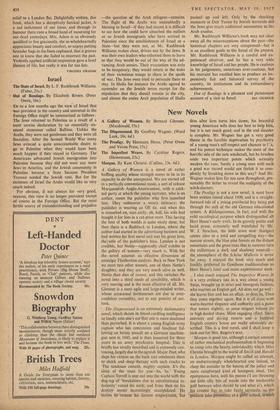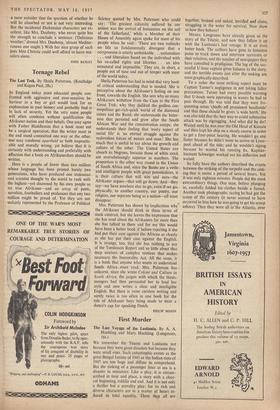New Novels
A Gallery of Women is a novel of rather baffling quality whose strength seems to lie in its capacity, to do the unexpected. We are started off in a perfectly conventional mode, a sort of urbane Marquandish Anglo-Americanistri, with a cock- tail party at which the young narrator, who is an author, meets the publisher who first launched him. They rediscover a weary intimacy; the publisher is wearing an OE tie, and when this is remarked on, says airily, oh, hell, his wife had bought it for him in a cut-price store. This having the best of both worlds is .quite nicely done, but then there is a ,flashback to London, where the author had started in the advertising businegs and had written ,his first novel and met his great love, thej wife of fhe publisher's boss. London is not credible, but Nettie---supposedly chief exhibit in the gallery of women—very much is. With her the novel assumes an effective dimension of nostalgic Flaubertian analysis. Back in'New York we meet two other women, one of them Nettie's daughter,• and they are very much alive as well. Nettie, then dies 'of cancer, and this switches the novel into a third mode of sensibility, which is very moving and is the most effective' of all. Mr. Glemser is a most agile and large-minded writer, whose occasional feeblenesses are due to .over- confident 'versatility, not to any paucity of out- look.
The Dispossessed is an extremely declamatory novel, which shouts its blood-curdling intelligence so loudly into one's ear' that one is more deafened than perturbed. It is about a young English army captain who has concussion and blackout fol- lowirig'an heroic assault on a German 'machine- gun nest in 1943, and is then immured for three years in an army psychiatric hospital. This, is briefly but vividly described and is extremely con- vincing, largely due to the ogreish Major Peat, who slaps his victims on the back and cdndernris them to' shock and sleep therapy with such cracks as `The sandman cometh, mighty captain.' It's the sleep of the must for you—ha, 'ha.' Young Captain Terrell is sent out into the world with the dog-tag• of 'breakdown due to constitutional in- feriority' round his neck., and from then on his destiny. seem's. increasingly maniPulated. He strives lci'lreaume his' former erriployment, 'but
firm after firm turns him down; his beautiful young American wife does her best to help him, but it is not much good, and in the end disaster is complete. Mr. Wagner has got a very good 'theme in the forcible deprivation by psychiatry of a young man's self-respect and chances in 17e, and his potent technique makes' the most of the horrific side of the new witchcraft, but he brushes aside two important points which 'seriously weaken the case. Surely a young man with such a goOd war record would not forfeit it so com- pletely by breaking down in this way? And Mr. Wagner makes him far too' sane throughout, pre- sumably the better to reveal the malignity of the witch-doctors.
The Prodigy is not a new novel; it must have been written round about 1900,' and is a straight- forward tale of a young provincial boy being put through the mill of, the old German educational system. A Bildungsronian, in fact, and with the mild sociological purpose which distinguished all Herr Hesse's early work. In its gravely poetic and lucid prose, extremely well translated by Mr. W. J. Strachan, the little town near Stuttgart comes alive in a total and compelling way—the narrow streets, the' blue pine forests on the distant mountains and the great trees that in summer turn the millstream a dark and shadowy emerald— the ,atmosphere of the Schone Miillerin is never far away. I enjoyed the book very much and frankly preferred its Goethean traditionalism to Herr Hesse's later and more experimental work.
1 also much enjoyed The Imperfect Weave. tit is a very ordinary tale in a way about a young Swiss, brought up in, strict and bourgeois fashion, who marries an English girl. All does not go well : she leaves him and has an affair, so does he, Then they come together again. But it is all done,with warm-hearted elegance and authority and a.poise that totters slightly, as some elegant women do in high-heeled shoes. MOst engaging effect. Swiss interiors and skiing resorts and a battered English, country house .are really admirably de- scribed. This is a first novel, and I shall. keep a look=out for Mrs. Rogers's next.
'Morgan is good too, although a certain amount of rather mechanical professionalism is beginning to creep into the hearty, individuality which Miss Christie brought to the world of Smith and Harold in London. Morgan might be called an attempt, an embarrassingly wholehearted one indeed, to clasp the outsider to the bosom of the jollier and more enlightened kind, of bourgeois ideal. The eponymous hero, with his poems CI am throwing out little silly bits of words into the intolerable gulf between what should be and what is'), which his creator has to lake fairly: seriously, as, the prefects take patriotism at a girls' school, Is°SlICEI
a tame outsider that the question of whether he will be absorbed or not is not very interesting. But the incidental Dickensian characters are ex- cellent, like Mrs. Daubeny, who never quite has the strength to conclude a sentence. (`Delicious weather,' droned Mrs. Daubeny, 'almost Mediter- ranean one might.') With her nice grasp of such jests Miss Christie could well afford to leave out- siders alone.
JOHN BAYLEY



































 Previous page
Previous page